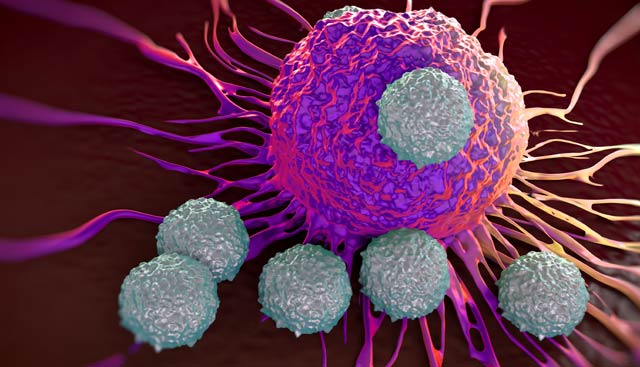Immunology Department Research Focus

The Department of Immunology faculty members focuses on elucidating mechanisms driving immune recognition of cancer cells, as well as targetable mechanisms of immunosuppression and immune evasion in tumor beds. By dissecting the immunobiology of multiple malignancies, Moffitt's immunologists are paving the way for a new generation of immunotherapies to combat cancer. The department faculty members are all members of the Moffitt Immuno-Oncology Program where synergistic interactions with clinical colleagues facilitate rapid translation of novel findings into the clinic.
Anti-cancer immune responses involve multiple types of immune cells, which are controlled by negative and positive signals emanating from the tumor microenvironment. Novel anti-cancer immunotherapies are generating new and quickly evolving biological settings that provide opportunities to dissect new fundamental immunological mechanisms. Department members work on elucidating complementary innate and adaptive immune mechanisms, with the overarching goal of targeting the molecular and signaling pathways that control these processes for the benefit of cancer patients.
A major immunosuppressive compartment blunting protective anti-tumor immunity depends on the mobilization of regulatory myeloid cells. This represents a complex mix of Myeloid-Derived Suppressor Cells, tumor-promoting granulocytes, immunosuppressive macrophages and regulatory Dendritic Cells (DC) that, together, prevent the effector T cell activity. Immunologists at Moffitt are elucidating and targeting complementary mechanisms of pathological myelopoiesis. Major advances are being made on elucidating unique aspects of DC function that can open up new avenues to modulate DC activity in cancer; the role of myeloid cells in dictating the efficacy of chemotherapy and targeted therapeutics; and the contribution of regulatory myeloid cells to the failure of checkpoint inhibitory immunotherapies.
Moffitt immunologists are also contributing to a rational implementation of immunotherapies based on T cell adoptive transfer. This includes cutting-edge trials using expanded TILs as well as CAR T cells. These translational studies initiated at Moffitt, as well as performed in collaboration with industrial partners, take advantage of our state-of-the-art GMP Cell Therapy facilities and opens new biological settings to understand the principles of the immune response.
Because innate immunity plays a critical role in early defense against tumors, the analysis of the signal pathways controlling the development, function, and analysis of signal pathways via key activating receptors of natural killer cells (NKs) is also an important focus of the department.
Moffitt researchers are also making significant discoveries on hematological diseases, including myelodysplastic syndrome. In addition, epigenetic studies in immune cells are providing novel insight into transcriptional regulators that induce tolerance or immune reactivity against cancer. Such work has revolutionized current thinking of the immune response against cancer.
Overall, the mix of basic and translational research programs is galvanizing major advances in the understanding of the immunobiology of cancer and providing a rationale design for the next generation of immunotherapeutic interventions.
Research Focus
